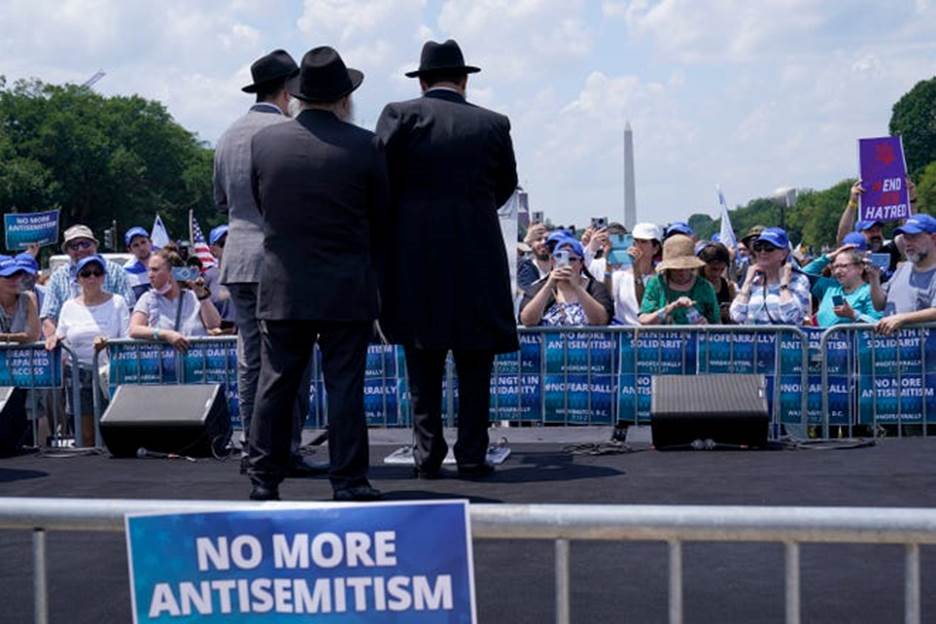
People attend a rally last July in Washington, DC, co-sponsored by the Anti-Defamation League and other organizations. The ADL's annual tally of antisemitic incidents in the US reached a record high last year, according to a report released this week – Susan Walsh, AP
Two groups that track religious discrimination have released reports showing record-setting increases in incidents this past year against Jewish and Muslim people nationwide, including in Ohio.
The Anti-Defamation League (ADL) and the Council on American-Islamic Relations (CAIR) released separate reports this week detailing upticks in harassment, discrimination, assault and structural and systemic biases in 2021.
The ADL, a New York-based anti-hate organization, recorded 2021 as the highest year for antisemitic incidents in Ohio since it began keeping track in 1979. That's after 2020 numbers reached a 40-year high.
There were 50 antisemitic incidents in Ohio in 2021, compared to 43 in 2020.
Nationwide, there were 2,717 incidents reported. This number represents an average of more than seven incidents a day and a 34% increase from 2020, which had 2,026 incidents, according to the ADL.
CAIR, a Muslim civil rights and advocacy group based in Washington, DC, reported 6,720 incidents of discrimination against Muslim people nationwide in 2021, with 365 reports to the office covering Columbus and Cincinnati. Nationwide, that is the highest number the group has seen in 27 years and a 9% uptick from 2020.
Experts from the organizations say it is unclear why there has been a recent rise in hate incidents.
“When it comes to antisemitic activity in America, you cannot point to any single ideology or belief system, and in many cases, we simply don’t know the motivation,” Jonathan A. Greenblatt , CEO and national director of the ADL, said in a statement. “But we do know that Jews are experiencing more antisemitic incidents than we have in this country in at least 40 years, and that’s a deeply troubling indicator of larger societal fissures.”
Muslim population growth shows in Columbus' crowded mosques
CAIR’s National Executive Director Nihad Awad said in a statement that American Muslims are making historic progress, but systemic Islamophobia still hasn't gone away.
"The federal government must address structural anti-Muslim bigotry in its own policies and the civil rights challenges facing Muslim communities," he said. "Everyone in our nation must be able to worship, work, travel and attend school freely and safely."
Antisemitism in Ohio
Over the past five years, there has been a 92% increase in antisemitic incidents in Ohio, with 26 occurring in 2017, according to the ADL.
The count includes criminal and noncriminal acts of harassment, vandalism, assault and intimidation.
Joel Marcovitch, CEO of the local nonprofit JewishColumbus , said he found the increase in antisemitism in Ohio concerning.
"The incidences in Columbus are few and far between; however, that doesn't mean to say there aren't things happening," Marcovitch said. "They may not necessarily be reported."
He said anti-Israel sentiment is part of the problem.
"We want to encourage people when they hear things, they should report it because these numbers are incredibly important and tell the story," Marcovitch said. "These numbers are on the rise, especially, as you can see, in Ohio."
The ADL report points to a surge in antisemitic incidents during the May 2021 conflict between Israel and Hamas. During that time, there was a 148% increase in reports compared to May 2020.
James Pasch, regional director of the ADL's Cleveland regional office, which serves all of the state, said in a statement that the issue isn't going away on its own.
"This problem is not going to disappear unless we act now to curb anti-Jewish hate in Ohio and across the nation."
Anti-Muslim discrimination
Amina Barhumi, acting executive director of CAIR-Ohio , which has offices in Columbus and Cincinnati, said the agency has seen an alarming amount of discrimination, receiving 365 calls for help in 2021.
"We receive about an average of a call a day for legal help," Barhumi said. "It's hard to say as to whether or not there's more anti-Muslim discrimination — which we think is the case — but we're also aware part of our work is to create awareness that the Muslim community understands and knows they have someone to report to."
The national report covers a range of issues, including discrimination related to immigration and travel; the workplace; denial of public accommodations; law enforcement and government overreach; hate and bias incidents; school incidents and more.
Barhumi said there are likely even more incidents happening than those that are documented, but they're not reported or Muslims aren't taken seriously when they do report.
Barhumi said discrimination against Muslims isn't limited to one political party being in power and has been going on for decades.
"Structural Islamophobia did not begin or end with particular president being in office," she said. "The impact of structural Islamophobia impacts individuals on a very human level; the ability to open up a bank account, the ability to work, the ability to go to school safely."
(This article originally appeared on The Columbus Dispatch)

